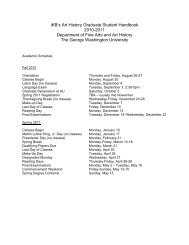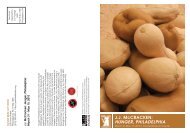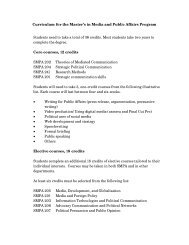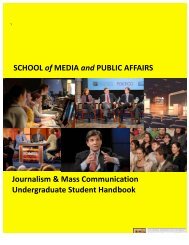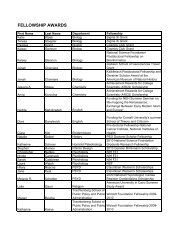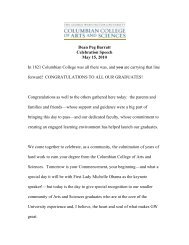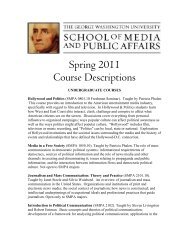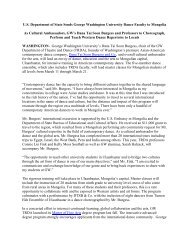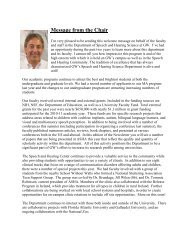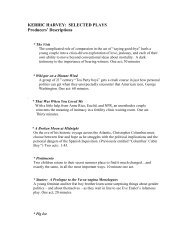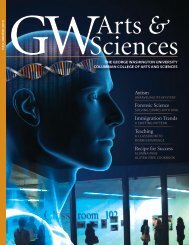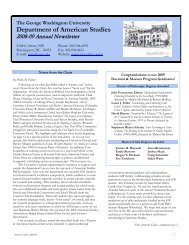Media Coverage and a Federal Grand Jury
Media Coverage and a Federal Grand Jury
Media Coverage and a Federal Grand Jury
You also want an ePaper? Increase the reach of your titles
YUMPU automatically turns print PDFs into web optimized ePapers that Google loves.
lier, on March 20, Watergate burglar James McCord broke ranks<br />
<strong>and</strong> implicated administration higher-ups, who soon fell like dominos,<br />
one by one knocking down more important Nixon advisors. 75<br />
Nearly two weeks before Anderson’s articles were published, White<br />
House counsel John Dean began cooperating with prosecutors <strong>and</strong><br />
implicated the President himself in the criminal conspiracy. 76 Thus<br />
Anderson’s justification for publishing the transcripts—that it was<br />
necessary to counter the administration’s ongoing cover-up—does<br />
not withst<strong>and</strong> chronological scrutiny. 77 Still, while Anderson’s publication<br />
of gr<strong>and</strong> jury transcripts may have come too late to influence<br />
events, a case can be made that he published them in good<br />
faith at the time in the belief that prosecutors might still cover-up the<br />
crimes of administration higher-ups.<br />
In subsequent years, Anderson exaggerated the role he played<br />
in uncovering the Watergate sc<strong>and</strong>al. For example, the columnist<br />
claimed that his publication of gr<strong>and</strong> jury transcripts convinced the<br />
President that he “could no longer use the gr<strong>and</strong> jury as an excuse<br />
for stonewalling…. Nixon’s strategy collapsed after I got hold of<br />
the secret testimony.” 78 In fact, however, the President continued to<br />
stonewall for more than another year, all the way to the end of his<br />
presidency. 79 “Did the publishing of this information [gr<strong>and</strong> jury<br />
transcripts] affect the outcome of Watergate?” Anderson asked rhetorically.<br />
“The answer is clearly yes.” Anderson even told one interviewer<br />
that his columns—along with White House counsel Dean’s<br />
disclosures to prosecutors <strong>and</strong> the Senate’s televised hearings—led<br />
to Nixon’s resignation. But this over-simplification is self-aggr<strong>and</strong>izing<br />
hyperbole. 80<br />
In any case, as promised, Anderson duly dispatched his attorney<br />
to Judge Sirica’s chambers with a copy of the gr<strong>and</strong> jury transcripts.<br />
The judge complained that the hundreds of pages of documents were<br />
out of order <strong>and</strong> asked Anderson attorney Betty Southard Murphy<br />
to straighten them up. Murphy refused, saying she did not want her<br />
fingerprints to appear on them. She did not tell Sirica that Anderson<br />
reporter Les Whitten had mixed up the pages of the records on purpose,<br />
“just to be nasty.” Sirica h<strong>and</strong>ed the lawyer a receipt for the<br />
transcripts <strong>and</strong> locked them in his safe. 81<br />
Nearly nine months later, Judge Sirica announced that a gr<strong>and</strong><br />
jury investigation into the Anderson leak failed to disclose the columnist’s<br />
source, despite “FBI interviews of court stenographers, assistant<br />
U.S. attorneys working on the Watergate case <strong>and</strong> others.”<br />
The only other “reasonable avenue of investigation,” Sirica said,<br />
was to try to force Anderson or his staff to reveal their source to the<br />
20 • American Journalism —



